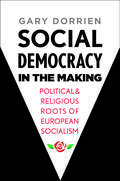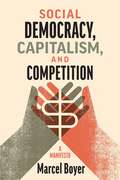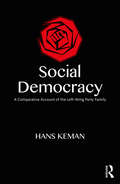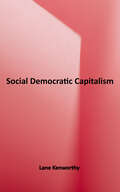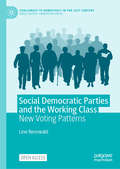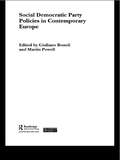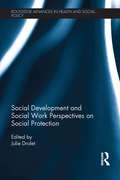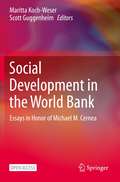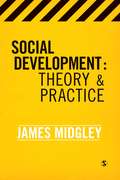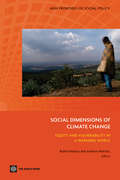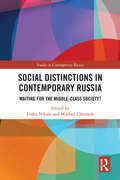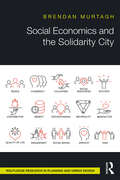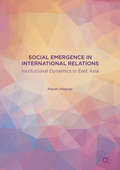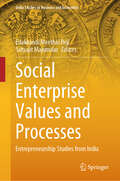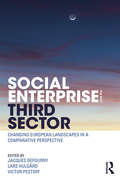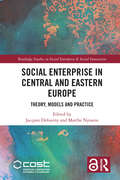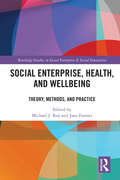- Table View
- List View
Social Democracy in the Making: Political and Religious Roots of European Socialism
by Gary DorrienAn expansive and ambitious intellectual history of democratic socialism from one of the world’s leading intellectual historians and social ethicists The fallout from twenty years of neoliberal economic globalism has sparked a surge of interest in the old idea of democratic socialism—a democracy in which the people control the economy and government, no group dominates any other, and every citizen is free, equal, and included. With a focus on the intertwined legacies of Christian socialism and Social Democratic politics in Britain and Germany, this book traces the story of democratic socialism from its birth in the nineteenth century through the mid‑1960s. Examining the tenets on which the movement was founded and how it adapted to different cultural, religious, and economic contexts from its beginnings through the social and political traumas of the twentieth century, Gary Dorrien reminds us that Christian socialism paved the way for all liberation theologies that make the struggles of oppressed peoples the subject of redemption. He argues for a decentralized economic democracy and anti-imperial internationalism.
Social Democracy, Capitalism, and Competition: A Manifesto
by Marcel BoyerOur social democracies and welfare states face economic and governance challenges that threaten their very survival. Against this backdrop, Social Democracy, Capitalism, and Competition argues that a true social democracy requires a clear definition and a refocusing of the roles of the public and private sectors.Using his novel competition-based social democracy and new competition-based capitalism models, Marcel Boyer goes back to the basics. Returning to the foundational characteristics of what social democracy and capitalism are supposed to be, he reimagines how public and social goods and services – such as education, healthcare, and transport infrastructure – can be provided in a way that aligns with citizens’ best interests. Boyer shows how recent decades have witnessed a shift away from competition and competitive processes, toward more bureaucratic control of public and social goods and services and more ironclad protection of state providers against contestation by potentially competitive organizations. This crony capitalism results in loss of purpose, organizational inefficiency, and outcomes that increasingly deviate from their original objectives of social wellbeing. Boyer maintains that productivity gains, economic growth, and prosperity for all actually require a degree of income and wealth inequality.Written with a facility that will appeal to anyone interested in public policy and economic reform, Social Democracy, Capitalism, and Competition is a book all governments should have on their reading list.
Social Democracy: A Comparative Account of the Left-Wing Party Family
by Hans KemanThe Social Democratic party family is a central part of political life in the West. This book focuses on this party family as well as a unique political force in the industrialised world. It provides a critical comparative survey of when, where, how and why Social Democracy developed within established capitalist democracies. The book explains the electoral fortunes of Social Democratic parties, the influence of the party system dynamics and co-operation between parties in government. It examines the ideological tensions within Social Democratic parties between socialists and reformists and its ramifications for pursuing a ‘better and kinder’ world. This study also discusses the recent state of affairs and its mission in the 21st century. The book features a comparative analysis of 21 cases from Australia, Austria, Belgium, Canada, Denmark, Finland, France, Germany, Greece, Ireland, Italy, Japan, Netherlands, New Zealand, Norway, Portugal, Spain, Sweden, Switzerland, the UK and the United States. It will be of key interest to students and scholars of public policy, comparative politics, party politics and democracy studies.
Social Democratic Capitalism
by Lane KenworthyWhat configuration of institutions and policies is most conducive to human flourishing? The historical and comparative evidence suggests that the answer is social democratic capitalism - a democratic political system, a capitalist economy, good elementary and secondary schooling, a big welfare state, pro-employment public services, and moderate regulation of product and labor markets. In Social Democratic Capitalism, Lane Kenworthy shows that this system improves living standards for the least well-off, enhances economic security, and boosts equality of opportunity. And it does so without sacrificing other things we want in a good society, from liberty to economic growth to health and happiness. Its chief practitioners have been the Nordic nations. The Nordics have gone farther than other rich democratic countries in coupling a big welfare state with public services that promote high employment and modest product and labor-market regulations. Many believe this system isn’t transferable beyond Scandinavia, but Kenworthy shows that social democratic capitalism and its successes can be replicated in other affluent nations, including the United States. Today, the U.S. lags behind other countries in economic security, opportunity, and shared prosperity. If the U.S. were to expand its existing social programs and add some additional ones, many ordinary Americans would have better lives. Kenworthy argues that, despite formidable political obstacles, the U.S. is likely to move toward social democratic capitalism in the coming decades. As a country gets richer, he explains, it becomes more willing to spend more in order to safeguard against risk and enhance fairness. With social democratic capitalism as his blueprint, he lays out a detailed policy agenda that could alleviate many of America's problems.
Social Democratic Parties and the Working Class: New Voting Patterns (Challenges to Democracy in the 21st Century)
by Line RennwaldThis open access book carefully explores the relationship between social democracy and its working-class electorate in Western Europe. Relying on different indicators, it demonstrates an important transformation in the class basis of social democracy. At the beginning of the twenty-first century, the working-class vote is strongly fragmented and social democratic parties face competition on multiple fronts for their core electorate – and not only from radical right parties. Starting from a reflection on ‘working-class parties’ and using a sophisticated class schema, the book paints a nuanced and diversified picture of the trajectory of social democracy that goes beyond a simple shift from working-class to middle-class parties. Following a detailed description, the book reviews possible explanations of workers' new voting patterns and emphasizes the crucial changes in parties' ideologies. It closes with a discussion on the role of the working class in social democracy's future electoral strategies.
Social Democratic Party Policies in Contemporary Europe (Routledge/ECPR Studies in European Political Science #Vol. 30)
by Martin Powell Giuliano BonoliThe end of the twentieth century saw an unprecedented coincidence of electoral success for social democratic parties in western Europe leading to intensive discussion on the future of this new European left. The debates often centred on the notion of a 'Third way' and generated major expectations for policy change among social democratic politicians and voters. The authors collected here examine the recent social and employment policies of these progressive parties, looking for change in the guiding principles of policy and on actual policy decisions. They show how the maxims of demand management and egalitarianism have been replaced by social investment and equality of opportunity and demonstrate the full extent of convergence on policies such as employment maximization, the containment of social expenditure and a shift towards a social investment welfare state.
Social Development and Social Work Perspectives on Social Protection
by Julie L. DroletSocial protection is now considered a development milestone and an important tool in combating poverty. Interventions can include, for example, health insurance, public works programs, guaranteed employment schemes, or cash transfers targeting vulnerable populations groups. This innovative volume is designed to develop understanding about the role and contribution of social protection globally and to share innovative practice and policies from around the world. It explores how to cover an entire population effectively, especially those who are at risk or who are already in a situation of deprivation, and in a sustainable manner. Divided into two parts, the book begins by exploring the theoretical underpinnings of social protection, discussing the social work and social development perspectives and concepts that currently shape it. The second part is comprised of case studies from countries implementing successful social protection initiatives, including Brazil, India, South Africa, Ghana, Nigeria and Indonesia, and reveals how the impact of a successful social protection intervention on poverty, vulnerability and inequality can be dramatic. This volume is an important reference for advanced students and researchers from a range of disciplines including social policy, social work, development studies, geography, planning, economics, sociology, population health and political science.
Social Development in the World Bank: Essays in Honor of Michael M. Cernea
by Maritta Koch-Weser Scott GuggenheimThis open access book honors the work of Michael Cernea, who was the World Bank’s first professional sociologist, by taking on and extending his arguments for "putting people first.” Cernea led a community of social scientists in formulating and promoting a comprehensive set of innovative and original social policies on development issues, which the World Bank adopted and implemented. This book includes globally significant work on urban and rural development, the epistemology of using social science knowledge in national and international development, methodologies for using social organization for more effective poverty reduction, and the experience of crafting social policies to become normative frameworks for purposive collective social action. And by including contributions from senior policy makers in the World Bank who helped shepherd social science's entry into development policy and practice, it provides a unique look at how organizational change can happen.
Social Development: Theory and Practice
by James O. MidgleyWalking through social development’s key theoretical principles and practice strategies, this book shows how it promotes peoples’ wellbeing not only in the Global South, where it first emerged, but in the Western countries as well. It covers: Definitions and an historical evolution of social development Key theoretical debates around social well-being, human rights and social justice Social development practice such as human capital interventions, community development and cooperatives, asset building, employment creation policies and programmes, microenterprises and social planning among others Future challenges; global poverty, international aid and trade, and global inequality, conflict and injustice. Complete with international examples drawn from around the world, Social Development: Theory and Practice demonstrates how social development theory translates into practical application. This book is essential reading for students in development studies, social policy, public administration and social work, and for policymakers and development practitioners everywhere. James Midgley is the Harry and Riva Specht Professor of Public Social Services at the School of Social Welfare, University of California, Berkeley.
Social Dimensions of Climate Change: Equity and Vulnerability in a Warming World
by Andrew Norton Robin MearnsClimate change is arguably the most profound challenge facing the international community in the 21st century. It is as much a challenge for poverty reduction, growth and development as it is a global environmental issue. It could undermine or reverse progress in reducing poverty and attaining the Millennium Development Goals, thereby unraveling many of the development gains of recent decades. It already threatens the livelihoods, health and well-being of millions of people worldwide, and of the poorest and most vulnerable groups in particular. And it has potentially far-reaching implications for international relations and for personal, national and regional security. While significant uncertainties still remain, tremendous strides have been made over recent years in improving scientific understanding of the human processes driving global climate change and the likely impacts on world ecosystems. What is much less well understood is how these dynamics in the physical environment will interact with those of socio-economic systems, what the consequences will be for society, and how best to address them. In order to focus attention on these previously neglected and poorly understood social dimensions of climate change, the World Bank convened an international workshop in March, 2008, with the participation of community activists, former heads of state, leaders of Indigenous Peoples, representatives of non-governmental organizations, international researchers, and staff of the World Bank and other international development agencies. This edited volume brings together revised versions of many of the papers presented during that workshop, as an initial step in taking stock of existing knowledge on the social dimensions of climate change. Several new papers were also commissioned for this volume.
Social Dimensions of the IMF's Policy Dialogue
by International Monetary FundA report from the International Monetary Fund.
Social Dissonance (Urbanomic / Mono #10)
by MattinAn argument that by amplifying alienation in performance, we can shift the emphasis from the sonic to the social.Work in sound studies continues to seek out sound "itself"--but, today, when the aesthetic can claim no autonomy and the agency of both artist and audience is socially constituted, why not explore the social mediation already present within our experience of the sonorous? In this work, artist, musician, performer, and theorist Mattin sets out an understanding of alienation as a constitutive part of subjectivity and as an enabling condition for exploring social dissonance--the discrepancy between our individual narcissism and our social capacity. Mattin's theoretical investigation is intertwined with documentation of a concrete experiment in the form of an instructional score (performed at documenta 14, 2017, in Athens and Kassel) which explores these conceptual connotations in practice, as players use members of the audience as instruments, who then hear themselves and reflect on their own conception and self-presentation. Social Dissonance claims that, by amplifying alienation in performance and participation in order to understand how we are constructed through various forms of mediation, we can shift the emphasis from the sonic to the social, and in doing so, discover for ourselves that social dissonance is the territory within which we already find ourselves, the condition we inhabit.
Social Distinctions in Contemporary Russia: Waiting for the Middle-Class Society? (Studies in Contemporary Russia)
by Jouko Nikula Mikhail ChernyshThis book analyses social change in Russia, in particular the development of a middle class, one of the most important social and political projects of Putin’s administration. Using unique survey data collected in 1998, 2007 and 2015, the authors make extensive and theoretically justified analyses of the changing social distinctions in Russia over the past 20 years. Offering a sophisticated analysis of classes and class they acknowledge that in class analysis there are different phases, requiring different concepts. The first phase is the analysis of class positions; the second is the study of the work and reproduction situations of class groups and the final step is the analysis of class interests. While acknowledging that there are a number Russian-specific factors that seriously complicate traditional class analysis, the authors maintain that the basic tenets of class analysis still hold true. The book will be of interest to students and scholars of sociology, political science, transition studies, social policy and Russian studies and anyone who wants to understand the internal divisions and organization of the middle class in Russia.
Social Dynamics in Swiss Society: Empirical Studies Based on the Swiss Household Panel (Life Course Research and Social Policies #9)
by Robin Tillmann Marieke Voorpostel Peter FaragoUsing longitudinal data from the Swiss Household Panel to zoom in on continuity and change in the life course, this open access book describes how the lives of the Swiss population have changed in terms of health, family circumstances, work, political participation, and migration over the last sixteen years. What are the different trajectories in terms of mobility, health, wealth, and family constellations? What are the drivers behind all these changes over time and in the life course? And what are the implications for inequality in society and for social policy? The Swiss Household Panel is a unique ongoing longitudinal survey that has followed a large sample of Swiss households since 1999. The data provide the rare opportunity to go beyond a snapshot of contemporary Swiss society and give insight into the processes in people’s lives and in society that lie behind recent developments.
Social Economics and the Solidarity City
by Brendan MurtaghSocial Economics and the Solidarity City explores the impact and potential of the social economy as a site of urban struggle, political mobilization and community organization. The search for alternatives to the neoliberal logic governing contemporary cities has often focused on broad and ill-defined political, social and environmental movements. These alternatives sometimes fail to connect with the lived realities of the city or to change the lives of those exploited in neoliberal restructuring. This book seeks to understand the capacity of the social economy to revitalize urban ethics, local practices and tangible political alterity. Providing a critical account of the social economy and its place in urban and state restructuring, this book draws on a range of international cases to argue that the social economy can be made a transformative space. Evaluating community enterprises, social finance, and solidarity economics, author Brendan Murtagh maps the possibilities, contradictions and tactics of moving the rhetoric of the just city into local and global action.
Social Education for Peace: Foundations, Teaching, and Curriculum for Visionary Learning
by Candice C. CarterCarter illuminates and validates the vital role of visioning in social education. The book features peace in social education with instructional recommendations, planning resources and descriptions of transdisciplinary learning. It elaborates mindful citizenship across social, environmental, ethical, geographic, economic and political realms.
Social Emergence in International Relations
by Maren WagnerThis book presents a conceptualization of social emergence in international relations as a novel angle to analyse institutional dynamics in East Asia, introducing the concept of emergence from a critical realist perspective. The author examines East Asia's characteristic mesh work of regional institutions that affect integrative processes and regional policies, exploring how such institutions emerge and acquire their own nature and why this pattern persists over time, an unresolved and contested subject in the field of International Relations. This book suggests that regional institutions are emergent entities of the international system that arise as forms of self-organization by states to achieve certain emergent properties and powers. The author's approach sheds light on the particular emergent properties and powers of regional institutions and identifies discourse as a key mechanism of social emergence. Besides engaging in relevant questions of the philosophy of science and its methodological implications for studying social emergence in world politics, the book also analyses the concrete case of two East Asian regional institutions: ASEAN Plus Three and the East Asia Summit. This book will engage scholars and postgraduate students of Asian Studies and International Relations.
Social Ends and Political Means (Routledge Revivals)
by Ted HonderichLeading British, American and European philosophers contribute to this collection of essays, first published in 1976, in political philosophy. They are essays which have to do in different ways with better societies than the ones we have, and with ways of getting them. They exemplify what can fairly be called real political philosophy. Its past makers have been Plato, Hobbes, Locke, Rousseau, Hegel, Mill and Marx, and it consists in advocacy of certain social ends and of certain means, rather than uncommitted inquiry or comment. The advocacy is of a kind, of course, which depends on analysis and argument. The book will be of interest not only to those who are primarily concerned with philosophy, but students of politics as well.
Social Enterprise Values and Processes: Entrepreneurship Studies from India (India Studies in Business and Economics)
by Satyajit Majumdar Edakkandi Meethal RejiThis edited volume is an interdisciplinary approach towards examining and integrating diverse theories, methodologies, and practices of social entrepreneurship. It highlights how social enterprises with their focus on resolving societal problems and driving social change, are critical for inclusive economic growth. The book is organized in three parts --- values, sustainability and social enterprise models; context, innovation and technology; and, perspectives and directions of future research in social entrepreneurship. The chapters contribute towards a better understanding of organizational and process dimensions of social and economic value creation, a relatively under-researched area in social entrepreneurship. They capture an extensive range of insights, analysis and case studies bringing together context specific dimensions and variables supportive of social enterprise creation and the development processes in social value creation. The book is useful for a wide range of audiences including social entrepreneurs, researchers, policy makers, development professionals, graduate and post graduate students seeking a deeper understanding of this evolving field. It also emphasizes practical guidance for individuals and organizations involved in social enterprise. It offers actionable insights, best practices, and real-world examples, enabling readers to apply the knowledge gained to their own contexts and effectively navigate the challenges and opportunities encountered in the field.
Social Enterprise and Special Events (Routledge Studies in Social Enterprise & Social Innovation)
by Julie OlberdingDuring the past twenty years, the field of nonprofit management has grown significantly in terms of the number of nonprofit organizations, number of people employed, and amount of funds raised. A key activity in nonprofit management has been organizing events, which are generally defined as "purposive gatherings of people." These purposes may include: increasing awareness about the nonprofit organization and its mission; raising funds to support programs and services related to its mission; engaging and developing individuals as donors, volunteers, and advocates; and enhancing the image of the organization and/or the broader community. Events in the modern era tend to be organized across the nonprofit, public, and private sectors. While a nonprofit organization may create and manage an event, corporations and businesses often contribute financial support and technical expertise in areas such as branding, marketing, and social media. Depending on the event type and size, a local government may provide the venue and public safety services, including police, fire, and ambulance. We can understand more about these mission-driven, cross-sectoral events by looking through the lens of social enterprise. Social enterprise has been defined as a venture that advances a social mission using business methods or market-based approaches. It is typically conceptualized as spanning sectors, particularly the nonprofit and private sectors. Social Enterprise and Special Events focuses on how market-based approaches can be used to help mission-driven gatherings achieve their purposes as efficiently, effectively, and sustainably as possible. These approaches include market research, brand development, cause marketing, gamification, liquidity, cash management, and clustering. The book also incorporates concepts important in the nonprofit and public sectors such as collaborative governance, social capital, political capital, community development, placemaking, and diversity.
Social Enterprise and the Third Sector: Changing European Landscapes in a Comparative Perspective
by Victor Pestoff Lars Hulgård Jacques DefournyThe concepts of social enterprise and social entrepreneurship are rapidly attracting increased attention in academic spheres and from policy-makers, as well as field workers who are setting up new initiatives or reshaping their organizations. These concepts are perceived as defining innovative and dynamic responses to major global challenges in today’s societies. The debate about social enterprise is now world-wide, with lively exchanges between American and European scholars. However, the research and landscapes still differ significantly in different regions, and diversity also exists within specific regions such as Europe. This book presents the most comprehensive set of contributions reflecting the European-wide debate, but with frequent connections to developments in other parts of the world. This book is a result of work carried out by members of the EMES International Research Network, which is a pioneer in this field. Social Enterprise and the Third Sector will appeal to all researchers who focus on the third sector, social economy and social enterprise, to MBA and postgraduate students, as well as to intellectual social enterprise leaders and practitioners. It will soon become a key reference for all those who want to explore the full richness of these concepts and follow this important academic debate.
Social Enterprise in Central and Eastern Europe: Theory, Models and Practice (Routledge Studies in Social Enterprise & Social Innovation)
by Jacques Defourny Marthe NyssensIn the last two decades, the quest for a widely accepted definition of social enterprise has been a central issue in a great number of publications. The main objective of the ICSEM Project (on which this book is based) was to show that the social enterprise field would benefit much more from linking conceptualisation efforts to the huge diversity of social enterprises than from an additional and ambitious attempt at providing an encompassing definition. Starting from a hypothesis that could be termed "the impossibility of a unified definition", the ICSEM research strategy relied on bottom-up approaches to capture the social enterprise phenomenon in its local and national contexts. This strategy made it possible to take into account and give legitimacy to locally embedded approaches, while simultaneously allowing for the identification of major social enterprise models to delineate the field on common grounds at the international level. Social Enterprise in Central and Eastern Europe – the last volume in a series of four ICSEM-based books on social enterprise worldwide — will serve as a key reference and resource for teachers, researchers, students, experts, policy makers, journalists and others who want to acquire a broad understanding of the social enterprise and social entrepreneurship phenomena as they emerge and develop in this region.
Social Enterprise in China (Routledge Studies in Management, Organizations and Society)
by Benedicte BrøggerThis book explores social innovation and entrepreneurship in China. Focusing on selected social enterprises and processes, it addresses the question of "why China?", not in terms of military, economic or political ambitions, but in the terms of social innovation and welfare policies. The analyses range from detailed ethnography to discussions of broad global trends. Despite vastly improved social conditions in the country, there are still unresolved issues that social enterprises address. The study elaborates on the complexities involved in their positioning between the state and their beneficiaries. Adding to the complexity is China’s dual system of circulation and the moral economy of ethnic minorities. The theoretical foundation of the study is the Durkheimian concept of the social contract. Its content is viewed as comprised of Maussian total social facts or guanxi, a similar Chinese framing, operationalised to particular socio-cultural configurations. The empirical cases document how social enterprises reposition elements in the various configurations in order to mobilise resources from their stakeholders. The book concludes that the discursive topology is altered in the process and the social contract is renewed in culturally meaningful, if paradoxical, ways. This book will be of interest to researchers, students and academics in the fields of business and social entrepreneurship, especially to those with a particular interest in the Chinese case.
Social Enterprise in China: State-Third Sector Relations and Institutional Effectiveness (Routledge Contemporary China Series)
by Echo Lei WangWang offers an empirically based exploration into work-integration social enterprises as a means for delivering social services in China. Focusing on the political economy of social enterprise development in China, Wang examines the nature of the relationship between the state and social enterprises and the implications of such relationships for their institutional effectiveness. She adopts a bottom-up approach that investigates indigenous practices embedded within the local political context. Common ground has been established internationally that the social enterprise model provides new ways of social service delivery that could potentially change and restructure the social welfare economy. However, the development path differs across social contexts, especially in an authoritarian country like China. This study provides insights into China's efforts to develop its social welfare sector and reinvigorate customary ideas about how public services could be better offered given the country's political economy. This book will be of great interest to both scholars of China’s political economy and those with an interest in the development of the social enterprise sector looking to see how this works in a Chinese context.
Social Enterprise, Health, and Wellbeing: Theory, Methods, and Practice (Routledge Studies in Social Enterprise & Social Innovation)
by Michael J. Roy Jane FarmerIn recent decades, governments have promoted social enterprise as a means to address welfare and tackle disadvantage. Early academic work on social enterprises reflected this development and engaged with their ability to deliver and create jobs, work towards remedial environmental goals, and address a range of societal challenges. More recently, researchers have started to investigate the broader potential of social enterprise for the wellbeing of people and the planet. In this context, this book aims to answer the question: In what ways can social enterprises improve the health and wellbeing of individuals and communities? The chapters in this edited collection take different perspectives on assessing how social enterprises address disadvantage and deliver health and wellbeing impacts. Drawing on evidence from international research studies, Social Enterprise, Health, and Wellbeing: Theory, Methods, and Practice presents the ‘first wave’ of innovative research on this topic and provides a platform of evidence to inspire the next generation of scholarly and policy interest. Drawing on the cutting edge of interdisciplinary research in the field, this book will be of interest to researchers, academics, policymakers, and students in the fields of entrepreneurship, public and social policy, community development, public health, human geography, and urban planning.
